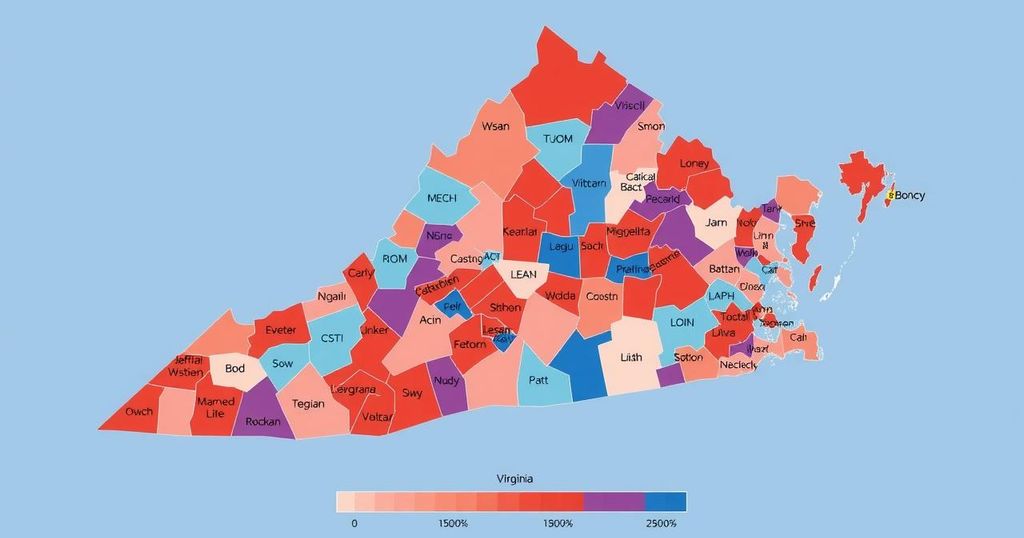Virginia’s recent special elections resulted in Democrats winning two left-leaning districts, preserving their majority in the state legislature and suggesting no major shift in voter sentiment since recent national elections. Political observers anticipate the 2025 gubernatorial race will more accurately reflect voter inclinations as potential candidates emerge. Governor Glenn Youngkin faces challenges in his final term amid a divided legislature.
This week’s special elections in Virginia yielded no unexpected outcomes, confirming the stability of the political landscape as Democrats successfully maintained their slender majority in the state legislature by securing victories in two left-leaning districts. Despite Republican hopes to seize control, particularly following their prior gains in the national elections, the results suggest voter sentiment remains largely unchanged. As Virginia prepares for its upcoming governor’s election, the implications for political dynamics, particularly in light of President Trump’s past election success, will be closely scrutinized.
Virginia’s special elections garnered significant attention due to their timing as the first electoral activity post-Donald Trump’s election victories. Democrats Kannan Srinivasan and JJ Singh triumphed in two districts, ensuring a continued Democratic edge in the state Senate and House of Delegates. However, the election of Republican Luther Cifers—a predictable outcome—highlighted the state’s complex partisan makeup. Approximately 19% of eligible voters participated in Loudoun County, indicating a slight increase from past special elections in the region, even amid challenging weather conditions.
Political analysts predict that the upcoming gubernatorial contest in 2025 will offer a more accurate reflection of voter sentiment than these special elections. “The upcoming governor’s race would be a much better gauge of political fortunes than three special elections,” stated Stephen Farnsworth, a political science professor. As the political climate evolves, Republican candidates, including current Lt. Gov. Winsome Earle-Sears and former Democratic U.S. Rep. Abigail Spanberger, are already positioning themselves for the gubernatorial race, which is expected to attract substantial national interest from both parties.
Governor Glenn Youngkin, who is term-limited, is navigating the final year of his governorship with potential legislative challenges ahead, particularly as he proposes budgetary amendments aimed at tax relief based on bipartisan support. As both parties gear up for the electoral battles, analysts foresee intensified efforts to demonstrate political agendas while appealing to their respective bases.
In summary, while the recent special elections reaffirmed Democratic control in Virginia, upcoming races, especially the gubernatorial contest in 2025, will be pivotal in shaping the political discourse and testing voter sentiment in a state that serves as a bellwether for national trends. The contest will invite significant financial and political investment from both Democrats and Republicans targeting their voter bases effectively, while Youngkin’s legislative proposals will continue to influence state politics over the coming year.
Virginia has captured national attention as one of the few states conducting an electoral contest immediately following a presidential election. The recent special elections occurred in the context of ongoing political analysis about voter engagement and sentiment, particularly in light of the state’s potential role in shaping the national political landscape. As a state that holds elections in odd-numbered years, Virginia serves as an early indicator of broader electoral trends, especially with significant positions up for grabs in 2025.
The recent special elections in Virginia illustrated no significant shifts in voter sentiment as Democrats maintained control over the state legislature. With important upcoming elections—including the gubernatorial race in 2025—analysts will continue to observe the state’s political dynamics. The legislative actions of Governor Youngkin alongside the strategies of emerging candidates from both parties will undoubtedly shape the political landscape as the state prepares for competitive electoral contests.
Original Source: abcnews.go.com






